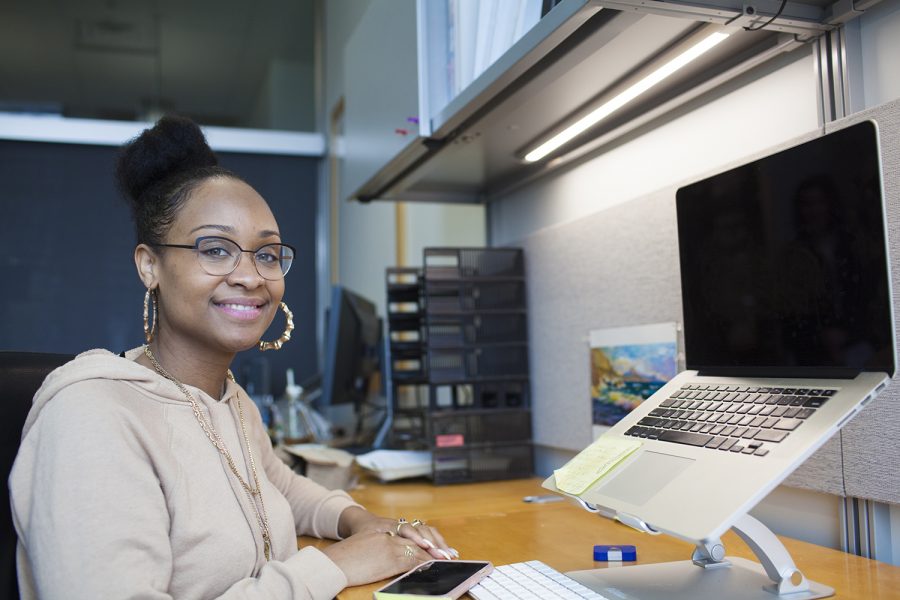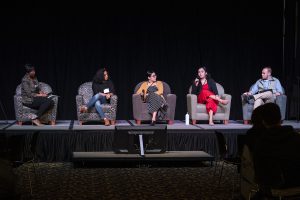Research conducted at the UI works to ‘see’ the problem with vision impairments
University of Iowa Ph.D. student Brittany Williams is conducting research on a protein critical to vision impairments affecting a large number of people. This protein, named Cav1.4, is responsible for impairments such as night blindness, and Williams’ research is making serious progress toward understanding its importance to vision.
University of Iowa neuroscience doctoral candidate Brittany Williams poses for a portrait in the PapaJohn Biomedical Institute on Wednesday, April 10th, 2019. Brittany is looking to looking to help those with visual impairments including night blindness which makes it difficult to see in relatively low light and makes driving/walking at night extremely difficult.
April 14, 2019
Night blindness is a common vision impairment experienced by people. Despite its prominence, understanding night blindness and other vision impairments has proven to be a difficult task among researchers. That’s where University of Iowa Ph.D. graduate research assistant Brittany Williams comes in.
Williams is a Ph.D. student in the Neuroscience Interdisciplinary Graduate Program who conducts research involving a protein called Cav1.4. The protein plays a large role in vision and the impairments associated with it, she said.
In the eye, some tissues contain photoreceptors, whose role is to take in vision information and send it throughout the retina to the brain for processing, Williams said. Cav1.4 is a key part of this process because of its role in the communication from the photoreceptor to neurons to send the information, she said.
In her research, she said, she has learned that “not everything works, and that’s OK.” The reason she loves science so much is because of the process of figuring things out and the collaboration involved, she said.
“Sometimes when you go to try to find an answer to a specific question, you may not get the answer you want, but you might get a better one,” she said.
The research done by Williams is conducted under the guidance of UI Assistant Dean and Professor Amy Lee. Working in Lee’s lab, Williams said, she has had the opportunity to be creative in her research while remaining focused.
Lee said working with Williams has been a very positive experience, and she is excited about Williams’ future. She said Williams’ identification of how Cav1.4 is regulated by molecular mechanisms shows how mutations that cause vision defects in humans might actually work.
RELATED: UI’s Institute for Vision Research receives $5 million gift for blinding eye disease
“I’m confident that, whatever she does, there’s going to be some important science that is going to come out of her lab …” Lee said. “She’s really going to be an outstanding role model and really motivate underrepresented minorities to follow in her footsteps.”
Along with the help Lee has given Williams in writing grants, executing experiments, and explaining research to different audiences, Williams also said Lee has taught her the importance of having one’s voice heard.
“She asks questions at every seminar, she makes sure that her research is well-spoken, and that she’s well-funded,” Williams said. “She is respected by a plethora of scientist and students. And, it is inspiring seeing a woman doing all of these things in a male-dominated field.”
Jessica Thomas, also a researcher in Lee’s lab, said in an email to The Daily Iowan that Williams’ research is extremely important because vision impairments affect so many people. She also said, through her time working with Williams, they have become quite close.
“Over the years, we have become more than lab mates; she is a sister to me,” Thomas said. “She is such a hard worker and has a brilliant mind. She definitely motivates you to keep up and keep pushing.”
As a woman and person of color, Williams said, her best advice for minorities in the field of science is to speak up, because “closed mouths never get heard.” Williams said Lee’s mentorship has helped her gain confidence in her research and be proud to speak up about her research.
“When you stop thinking about what others may think, and you just truly live to what your happiness is and exude that — I think that’s what really matters,” she said. “And by doing that, you don’t realize how many people you inspire.”






